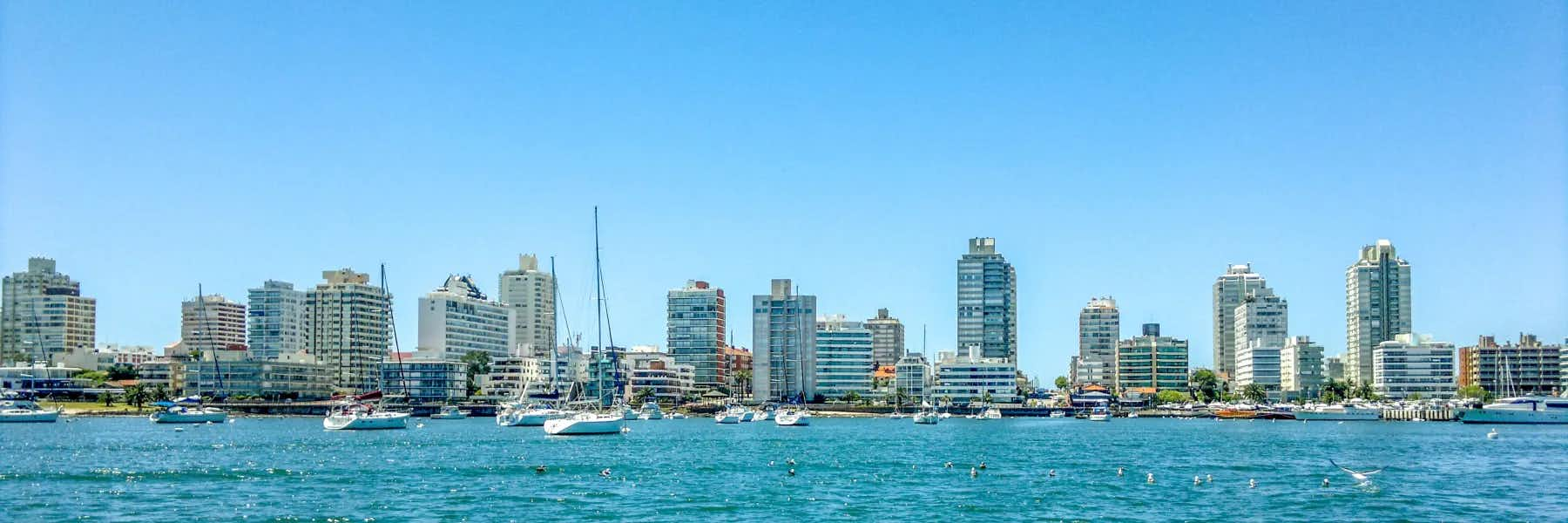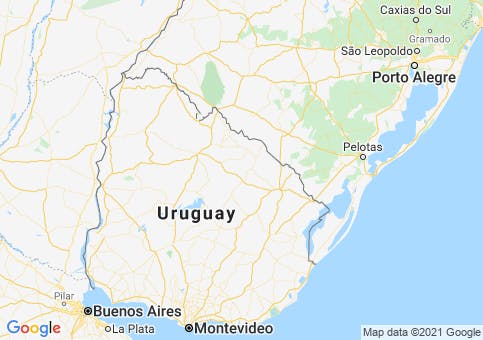By David Hammond
Maybe you’ve read about Uruguay and it piqued your interest.
Or you traveled to Uruguay and felt an attraction or home-feeling you didn’t expect.
The idea of moving to Uruguay formed in your mind.
It seemed crazy at first—moving across the world to a tiny agricultural country on the east coast of South America. Who would do something like that?
But the idea of moving to Uruguay keeps coming back.
And the more you think about it, the less crazy it seems.
If that’s your experience, I know just what you mean.
That’s how it was for me, too.
I read about it, visited, and decided to make the move.
I can tell you firsthand, relocating to a new country like Uruguay is more involved than moving across town. You’ll likely need to become a legal resident, open a bank account, sign up for a health-care plan, find a place to live, ship your household furnishings (if you choose), and learn some basic Spanish.
The following is an overview of these relocation tasks to give you an idea of what’s involved when you move to Uruguay.
Looking at everything there is to do all at once may seem a little daunting. But if your experience is like mine, I think you’ll find it is all part of the adventure of starting a new life in a new country.
Plus, you’ll find residency and relocation services, as well as other expats who made the move ahead of you, who can advise, help, and provide perspective, each step of the way.
Becoming a Legal Resident in Uruguay
The process to become a resident of Uruguay is somewhat unique. Instead of having to go through a consulate outside of Uruguay, you can make your application and complete the residency process within Uruguay after you arrive.
The government office that deals with immigration and residency matters is Uruguay’s National Directorate of Migration, Dirección Nacional de Migración (DNM). It’s where you submit your application with the associated documents.
The Basic Requirements to Become a Resident of Uruguay Include:
Providing proof of your income
You’re required to provide evidence of your financial means of support in an amount that’s reasonable to support the number of applicants in your family. Generally, an income of $1,500 per month will suffice for a single applicant.
A background check
For U.S. citizens this is an FBI report that can be obtained through the Interpol Office in Montevideo, Uruguay. For non-U.S. citizens, it’s a police record from your country of origin and country of residence for the last five years.
A Uruguay health card
This involves a simple medical exam at an approved clinic in Uruguay.
Additional documentation
You’ll also need your birth certificate (not required for residence, but necessary to obtain your Uruguayan ID card), and your marriage certificate, if married.
The birth certificate, marriage certificate, and non-Interpol (non-U.S.) police records must be apostilled in the country where they were issued. (“Apostille” is an authentication process used by most countries.) Once you arrive in Uruguay, these documents need to be translated into Spanish by an official public translator.
As soon as you’ve submitted all your paperwork for review, you’ll get a temporary cédula (ID card). It enables you to live in Uruguay as a “resident in process”, while you wait for your final approval—usually less than 12 months.
Opening a Bank Account in Uruguay
You may need to receive deposits in a Uruguayan bank to satisfy the residency proof of income requirement. A local bank account also provides a convenient way to pay your local bills.
Like all financial institutions, banks in Uruguay must verify the identity of depositors and the source of deposited funds.
Most private banks in Uruguay don’t accept U.S. citizens as customers (due to the extra hoops and paperwork involved). However, if you’re a U.S. citizen, you’re not out of luck. Many successfully open accounts at Banco Republica (BROU), Uruguay’s state bank.
A basic BROU account consists of your deposit (in your choice of Uruguayan pesos, euros, or U.S. dollars) and a debit card.
The requirements to confirm a bank customer’s identity and source of funds often include:
Applying at the bank in person with your passport and a second photo ID
A utility bill proving your home address
Proof of income and references.
However, keep in mind that the specific requirements vary among banks and tend to change. Check current banking document requirements (as well as current residency requirements) with a reputable residency and relocation service professional shortly before you come to Uruguay.
Signing up for a Health Care Plan in Uruguay
The most popular health care solution among expats living in Uruguay is a private hospital membership plan called a mutualista.
A mutualista is different from health insurance. With a mutualista there is no middleman between you, the member, and the private hospital that provides your medical care.
Once you become accepted as a mutualista member, you’ll go to your private hospital or one of its clinics for all your medical needs including routine doctor visits, tests, procedures, surgeries, and emergencies. Membership in a mutualista usually costs less than $100 per month. In addition to the monthly fee, a small co-payment is due when you see a doctor or have a medical test.
As a private company, a hospital mutualista sets its own age and pre-existing condition guidelines for accepting or not accepting non-employed members. Some are reluctant to take new members over 60 or 65, others will.
There is also the public health care system, which can operate similar to a mutualista, except with no restrictions for age or pre-existing conditions.
Importing Your Household Goods to Uruguay
As a new resident in Uruguay, you’re entitled to move all of your household effects duty-free—a benefit in a country with high import duties.
Under the program, you may import your furniture and household effects after you formally apply for residence.
The entities involved with your move include
The moving agent who works with you on your departure end getting the entire move booked.
The Uruguayan moving agent who works for the moving company who is completing your move in Uruguay, and is your primary authority when you have questions about Uruguayan regulations.
Thecustoms agent is the government employee who performs inspections and enforces customs regulations. The public does not interface directly with this agent. (I was politely referred to a despachante on my third visit.)
Your reputable residency and relocation specialist can explain the details and timing requirements.
Renting a place to live
In Uruguay, apartment leases usually run one to two years and move-in costs include a large deposit. Since it’s not something you want to rush into, it often makes sense to stay in a furnished short-term rental (like an Airbnb property) while you learn about the area and decide exactly where you want to live.
Then, look for a long-term rental when you’re ready.
When that time comes, I recommend starting the process by finding a good bilingual real estate agent to represent you before finding an apartment or house to rent.
Often, the best way to find a good real estate agent is recommendations from other English-speaking expats in Uruguay.
While looking for a rental, be clear on your total move-in costs.
Move-in costs when renting a home commonly include
First month’s rent: Paid in advance to the landlord.
Deposit or guarantee: Often an amount equal to three to five month’s rent.
Real estate agent commission: Ask you agent about his or her fee upfront.
In order to understand and compare your long-term rental options, you need to know all the expenses contributing to your total housing cost, such as common building expenses, utility costs, and taxes.
Common Expenses
Most apartments have common expenses. The common expenses (gastos comunes) are a monthly fee shared by a building’s occupants to cover costs such as lighting common areas, salaries for porters, and routine building maintenance.
Utilities
It’s important to know what utilities are included with the rent and what utilities you pay. Water is usually included; electricity, phone, and internet are usually not. If a home has electric heating, seek an estimate for winter heating costs.
Taxes
While the property owner pays the lion’s share of property taxes, there are a couple of taxes you, as a tenant might pay. One in Montevideo is the Tributos Domiciliarios (residential taxes), which are due six times a year. Another is the Tarifa de Saneamiento (sanitation fee). This is sometimes included as part of the gastos communes.
Bringing Your Pet to Uruguay
To bring your dog or cat to Uruguay, the process is relatively simple and there is no quarantine period once you arrive.
The dog or cat must be accompanied by a USDA-endorsed health certificate, even if you don’t live in the U.S. Most vets will have the appropriate form.
The health certificate must indicate proof of both rabies vaccination and Praziquantel treatment for the tapeworm Echinococcus granulosus. (The Praziquantel treatment is for dogs only). The certificate must also state the animal was examined within 10 days of departure and presented no clinical signs of diseases associated with that species.
Time frame for the rabies vaccination is more than 30 days and less than one year before the arrival date in the country.
The time frame for Praziquantel treatment is more than 72 hours and less than 30 days before the arrival date in Uruguay.
Learning to Speak Spanish
Learning some Spanish will make your experience in Uruguay increasingly easier and more interesting.
Consider studying Spanish-language basics with a home-study course before you make the move.
Then, once you’re in Uruguay, take some classes at a local Spanish language school. Besides picking up some Spanish, you’ll learn about the culture, get tips for day-to-day life, and likely make some new friends.
Here are a couple of well-established schools:
La Herradura offers a variety of Spanish-learning courses in Montevideo and Punta del Este. Classes are supplemented with lots of extracurricular activities. https://www.spanish-herradura.com/
Academia Uruguay is located in Montevideo’s Old City. They offer a broad range of learning options and have planned student activities. They can also help make housing arrangements. https://www.academiauruguay.com/














